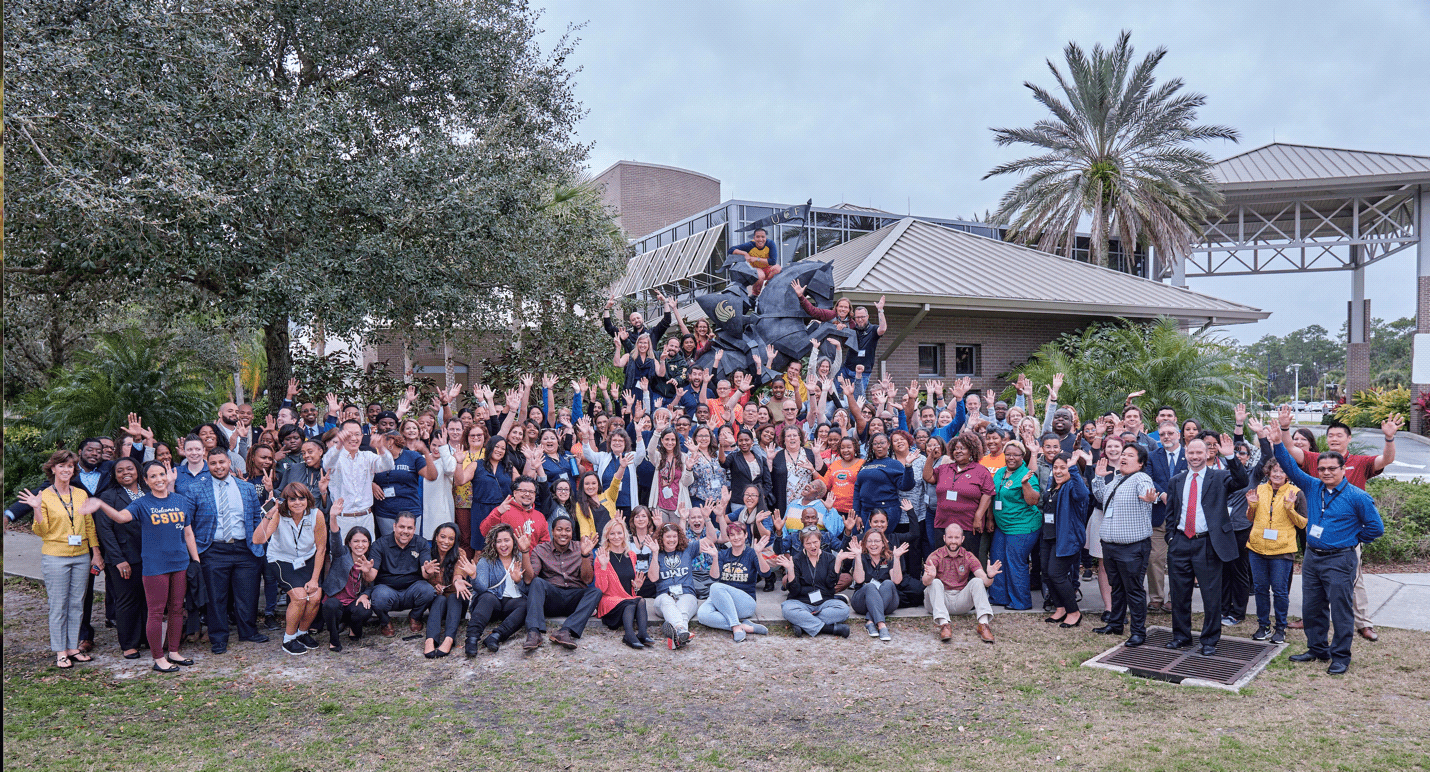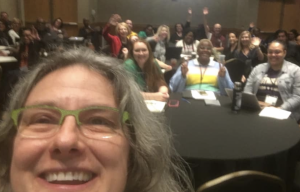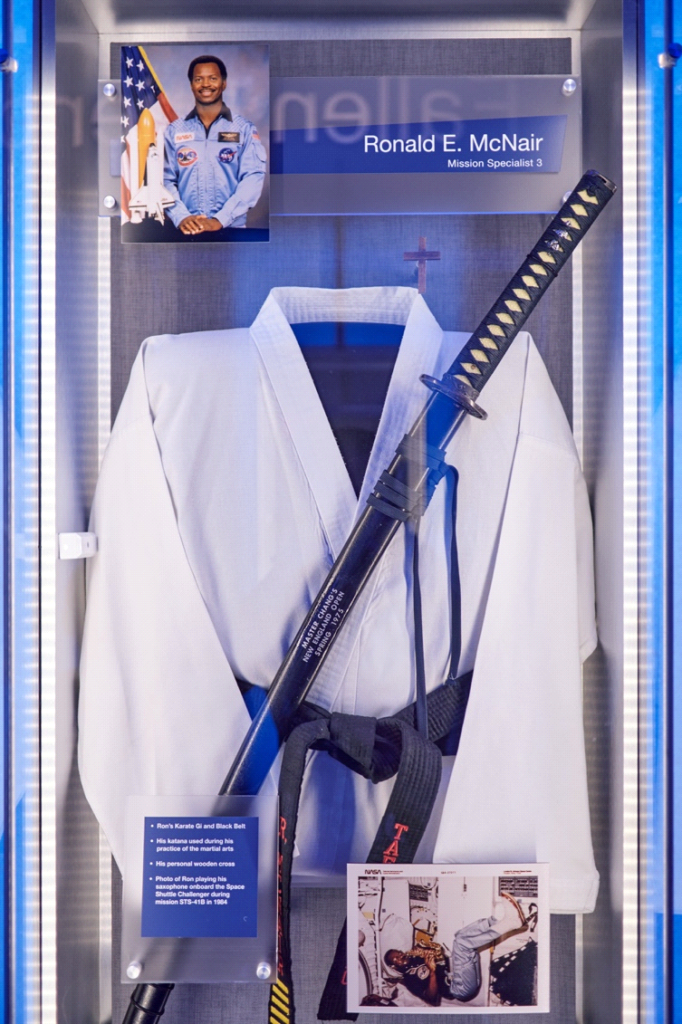At the beginning of February 2020, the EWU McNair program's Assistant Director, Cynthia Dukich, joined over 150 people representing 89 McNair Scholars programs from around the country as they came together at the 6th Annual McNair Promising Practices Institute (MPPI) at the University of Central Florida to learn and share about the most innovative practices taking place in the TRIO Ronald E. McNair Post-baccalaureate Achievement Program community.

This interactive forum gave McNair professionals the opportunity to share best practices in providing research and other scholarly activities that prepare first-generation, low-income, and/or those from under-represented groups for a successful path to the PhD and beyond.
As one of the MPPI presenters, Cynthia Dukich, shared analytical writing workshop strategies she developed in her work with the EWU McNair program that have been shown to strengthen student analytical writing and improve GRE writing scores.  Strategies included weekly writing practice with process-oriented individual feedback, group exercises, and peer review sessions. These sessions not only build academic writing skills, but also academic confidence and a support network. “Scholarly community and a sense of belonging really are key to the long-term success of our scholars,” Dukich states. “We strive to create a feeling of community through all of our program services, and in our writing workshops we want to focus on how we can provide writing feedback and develop skills that aren’t only to improve the clarity of a particular piece, but also that support the ongoing process of becoming an academic writer.”
Strategies included weekly writing practice with process-oriented individual feedback, group exercises, and peer review sessions. These sessions not only build academic writing skills, but also academic confidence and a support network. “Scholarly community and a sense of belonging really are key to the long-term success of our scholars,” Dukich states. “We strive to create a feeling of community through all of our program services, and in our writing workshops we want to focus on how we can provide writing feedback and develop skills that aren’t only to improve the clarity of a particular piece, but also that support the ongoing process of becoming an academic writer.”
The TRIO Ronald E. McNair Post-baccalaureate Achievement Program was named after astronaut Ronald E. McNair, an accomplished saxophone player, 6th degree black belt in karate, with a PhD in laser physics from MIT, and the second African American to fly in space. His first space shuttle mission launched successfully from Kennedy Space Center on February 3, 1984. This brilliant scholar’s life was cut short on his second space flight where he was serving as the mission specialist on the space shuttle Challenger which exploded after launch instantly killing all aboard. His legacy lives, however, through the program that bears his name. The TRIO Ronald E. McNair Post-baccalaureate Program was funded through the US Department of Education TRIO Program in 1986 with the goal of increasing diversity in academia by providing opportunities for research and other scholarly activities to high potential students from first-generation, low-income and underrepresented backgrounds. MPPI participants had a chance to visit the Kennedy Space Center, and see the memorial to those lost on the Challenger, including the tribute to Dr. Ronald E McNair (pictured below), which includes in the lower right corner a picture of him playing his saxophone in space.

Eastern’s TRIO McNair program was first funded in 1995, and has successfully competed and been awarded funding in all successive TRIO Department of Education grant competitions since. With over 150 TRIO McNair programs currently funded nationwide, Eastern’s program participates in a nationwide network committed to nurturing academic excellence through supporting diverse perspectives. Each person who is the first person in their family to earn a bachelor’s degree begins to blaze a trail for everyone in their family. The PhD takes people farther down that trail to a destination many first-generation, low-income students didn’t ever realize was a possibility. With a graduate degree, McNair scholars are not only role models for their families and communities, but are also able to bring their perspective and experience into academia as they teach and mentor the next generation. Since 1995, 39 EWU McNair Scholars have completed their PhD’s and over 117 have earned Master’s degrees.
In a recent panel, EWU McNair scholars spoke about the benefits of this program: "It gave me a support system and provided mentorship to guide me in making decisions along the way to getting to grad school," said senior Lily Ann Long, who has been accepted to the Psy.D. program at Point Park University.
Senior Abdulrazik Mohamed shared, "Writing was an obstacle for me as a first-generation college student and someone learning English, but McNair's support helped me make huge improvements." Abdu has been accepted by three Masters programs, one with a generous scholarship. He also has been awarded the Foreign Language and Area Studies Fellowship which will give him full funding at any university of his choice!
“In presenting our success with analytical writing strategies,” Dukich states of her experience at MPPI, “I wanted to connect with other McNair professionals to build momentum around ways to enhance scholarly writing. When students learn that writing is a skill that continues to develop, and when they have strategies to demonstrate improvement and see their own growth, they begin to discover that writing is not a talent that some people inherit at birth and they gain confidence in their ability to define and describe their own diverse ideas in writing.”
At events like MPPI, McNair professionals continue to gather and share best practices, strengthen one another, and also set the example for institutions in higher education as to how best to serve first-generation, low-income, and underrepresented students. The EWU McNair Scholar program is proud to be a part of this work!
EWU McNair Alumna Sandra Espinoza summed up the power of McNair programs in an interview when she exited the program: "The Ronald E. McNair Post Baccalaureate Achievement Program at Eastern Washington University is an extraordinary, effective, and life changing program. As a first-generation, low-income, and underrepresented student, I had no resources, role models, or advisors my freshman and sophomore year in college. I was insecure about my future and was terrified to use my voice. It wasn't until I applied and got accepted to the McNair program where I finally felt secure, confident, and brave to explore and dismantle traditional cycles that fabricate our society. McNair provided me the opportunity to complete an internship in the summer where I was allowed to collaborate with a mental health psychologist in the Counseling and Psychological service department at EWU. My mentor helped me complete my research study by meeting with me weekly, revising my writing structure, and providing resources and tools to help me enhance my writing and speaking abilities. The McNair program also helped me prepare for the Graduate Record Examinations with workshops, online study guides, and writing seminars. Furthermore, I was able to attend regional conferences and network with faculty and graduate students during campus tours which was all covered financially by the McNair program. A feminist, activist, and a proud Mestiza, describes who I am today and the woman that I have always aspired to be when I was a child. I couldn't have done it without the support, guidance, and contribution of the McNair program." Sandra is currently pursuing her PhD in counseling psychology with full funding at Western Michigan University.

